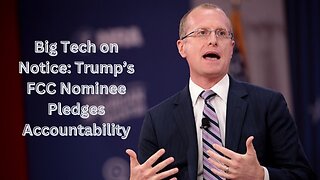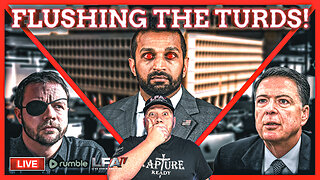Premium Only Content

Advertising in the Realm of Dreams: Ethical Considerations and Concerns
In today's world, the pervasive nature of advertising has taken an unprecedented turn with the emergence of Targeted Dream Incubation (TDI). This technique, employed by companies like Molson-Coors, delves into the realm of our subconscious minds, aiming to implant brand imagery and associations into our dreams. By strategically introducing sounds or scents during wakeful moments and later replicating them while we sleep, advertisers seek to influence our nocturnal experiences.
While proponents argue for potential therapeutic benefits in areas like depression and addiction, the ethical implications of such practices are profound. Concerns abound regarding the exploitation of our innermost thoughts by profit-driven entities. Notably, major corporations including Microsoft, Sony, Burger King, and airlines are exploring avenues of dream advertising, further amplifying apprehensions among sleep researchers.
Our dreams, integral to memory consolidation and emotional processing, now face intrusion from commercial interests, prompting critical reflections on privacy and consent. As smart devices proliferate, the specter of advertisers surreptitiously infiltrating our dreams via audio signals looms large, underscoring the urgency of ethical safeguards. A recent open letter signed by numerous scientists warns against allowing corporate interests to transform our dreams into a battleground for consumerism.
Ultimately, the sanctity of our subconscious minds hangs in the balance as society grapples with the implications of commercializing our dreamscape. As we venture into this uncharted territory of dream advertising, safeguarding the integrity of our innermost thoughts becomes paramount to prevent their exploitation for commercial gain.
-
 1:33
1:33
Conspiracy Chronicle
2 months agoTrump Declares War on Big Tech Censorship with Bold FCC Pick
1161 -
 LIVE
LIVE
Bannons War Room
8 days agoWarRoom Live
21,994 watching -
 LIVE
LIVE
House Committee on Energy and Commerce
4 days agoO&I Hearing: Examining the Biden Administration’s Energy and Environment Spending Push
318 watching -
 LIVE
LIVE
LFA TV
15 hours agoFLUSHING THE TURDS! | LIVE FROM AMERICA 2.26.25 11AM
3,332 watching -

Matt Kohrs
12 hours agoThe Crypto Crash, Stock Bounce & Breaking News || The MK Show
23.3K2 -
 LIVE
LIVE
Caleb Hammer
31 minutes agoFinancial Audit’s Dumbest Couple Ever
173 watching -
 LIVE
LIVE
MYLUNCHBREAK CHANNEL PAGE
23 hours agoA Little Season in the East?
281 watching -
 DVR
DVR
VSiNLive
1 hour agoA Numbers Game with Gill Alexander | Hour 1
3.67K -
 1:18:45
1:18:45
Dear America
2 hours agoTrump: Russia/Ukraine Peace Deal IMMINENT! + Tucker RESPONDS To Crenshaw!
25.4K12 -
 45:09
45:09
BonginoReport
4 hours agoNSA Perverts Caught & FIRED (Ep.148) - 02/26/2025
74.1K92